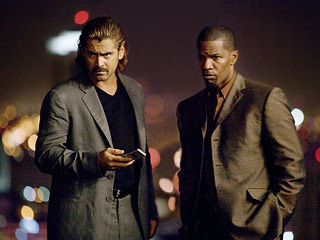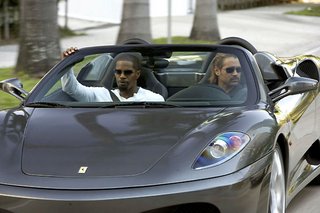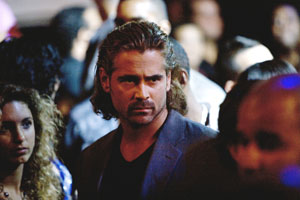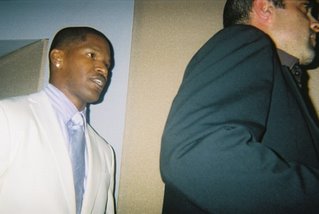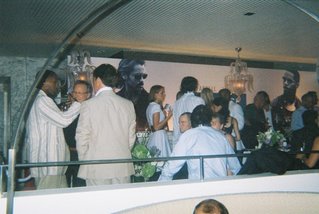THERE'S SOMETHING IN THE WATER...
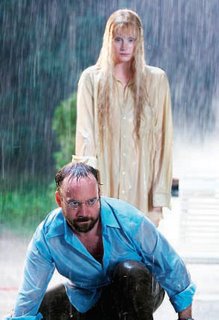
Lady In The Water (15)
reviewed by David Mahmoudieh at the
UK premier, Leicester Sq, London
M. Night Shyamalan, writer and director of such tales as Stuart Little, The Sixth Sense, Unbreakable, Signs and The Village has earned himself a reputation over the past seven years for being – however talented – a downright difficult, self-promotional prima donna. His insistence on controlling every facet of his productions, refusing to accept any executive interference from his producers in favor of his own trusted, non-conformist methodologies mirrors that of a cocaine-fuelled rock star trying to play every instrument in his band. The word 'collaborative' obviously doesn't exist within this particular director's private vocabulary.
His newest solo-effort, the non-genre Lady In The Water has, as expected, done nothing to dispel these views – through crucially, where his previous efforts spoke for themselves, LITW is in fact a disappointment of nigh-epic proportions, carrying none of the uplifting or triumphant values as its predecessors.
Shyamalan attempts to tell the somewhat strange story of an apartment superintendent named Cleveland Heep (reliable sad-sack Paul Giamatti, Sideways) who becomes ensconced within a mythological fantasy after being rescued by the title character (Bryce Dallas Howard) – a mysterious, delicate young woman from a fairy-tale, trying to make the treacherous journey from our world back to hers.
Why she wondered out of wonderland in the first place soon becomes apparent in her quest of awakening the latent inspiration of a struggling writer who lives within the apartment block.
Before long Cleveland and his fellow tenants begin to realize that they too are implicated as characters in this fable and must help the young nymph get back to her “Blue World”, whilst protecting her from a snarling “Scrunt” who will do everything to kill her along the way; a “Scrunt” being a big wolf-like creature with a back covered in grass.
I have to say, it feels pretty damn pointless trying to explain what a “Scrunt” is, because a “Scrunt”, in truth, is whatever M. Night Shyamalan wants it to be. None of it has any practical or foundational basis and so you either throw yourself in at the deep-end with childlike compliance, or you take the cynic's route. In this case, the latter is most definitely justified.
A story originally conceived by Shyamalan for his children, the filmmaker clearly sets out to make a celluloid bed-time story. And given that bedtime stories are supposed to send you to sleep, does succeed in one sense.
But Lady in the Water is mythmaking in its most complex and un-enjoyable form, creating a cat-and-mouse game between him and his audience, almost necessitating that we try and figure out the filmmaker’s machinations rather than simply be swept along for the ride.

To Shyamalan’s credit, he has assembled an immensely talented cast and engraved the picture with a well-thought-out, strong visual design (engineered by legendary cinematographer Christopher Doyle), and the end-result does inject glimpses of genuine menace and mystery into the otherwise mundane location of a secluded apartment complex.
But the essential magic needed to teleport you from reality into fantasy is missing; the specifics of the fairy tale are simply too vague and convoluted to inspire any real confidence in its mythology.
Shyamalan's films have earned $2 billion box-office dollars worldwide, with his last film alone, the critically-panned The Village, taking $250 million in worldwide receipts, so there’s clearly something about his ideas which resonate with an audience.
The career of a long-time filmmaker carries almost an inevitability of a flop rearing its ugly head somewhere along the line. And in all fairness, Shyamalan has given us two genuine masterpieces in The Sixth Sense and Unbreakable, meaning there’s every reason to believe there are still voices in the director’s head well worth a listen.
Unfortunately, Lady in the Water isn’t one of them.
© David Mahmoudieh 2006

Lady In The Water (15)
reviewed by David Mahmoudieh at the
UK premier, Leicester Sq, London
M. Night Shyamalan, writer and director of such tales as Stuart Little, The Sixth Sense, Unbreakable, Signs and The Village has earned himself a reputation over the past seven years for being – however talented – a downright difficult, self-promotional prima donna. His insistence on controlling every facet of his productions, refusing to accept any executive interference from his producers in favor of his own trusted, non-conformist methodologies mirrors that of a cocaine-fuelled rock star trying to play every instrument in his band. The word 'collaborative' obviously doesn't exist within this particular director's private vocabulary.
His newest solo-effort, the non-genre Lady In The Water has, as expected, done nothing to dispel these views – through crucially, where his previous efforts spoke for themselves, LITW is in fact a disappointment of nigh-epic proportions, carrying none of the uplifting or triumphant values as its predecessors.
Shyamalan attempts to tell the somewhat strange story of an apartment superintendent named Cleveland Heep (reliable sad-sack Paul Giamatti, Sideways) who becomes ensconced within a mythological fantasy after being rescued by the title character (Bryce Dallas Howard) – a mysterious, delicate young woman from a fairy-tale, trying to make the treacherous journey from our world back to hers.
Why she wondered out of wonderland in the first place soon becomes apparent in her quest of awakening the latent inspiration of a struggling writer who lives within the apartment block.
Before long Cleveland and his fellow tenants begin to realize that they too are implicated as characters in this fable and must help the young nymph get back to her “Blue World”, whilst protecting her from a snarling “Scrunt” who will do everything to kill her along the way; a “Scrunt” being a big wolf-like creature with a back covered in grass.
I have to say, it feels pretty damn pointless trying to explain what a “Scrunt” is, because a “Scrunt”, in truth, is whatever M. Night Shyamalan wants it to be. None of it has any practical or foundational basis and so you either throw yourself in at the deep-end with childlike compliance, or you take the cynic's route. In this case, the latter is most definitely justified.
A story originally conceived by Shyamalan for his children, the filmmaker clearly sets out to make a celluloid bed-time story. And given that bedtime stories are supposed to send you to sleep, does succeed in one sense.
But Lady in the Water is mythmaking in its most complex and un-enjoyable form, creating a cat-and-mouse game between him and his audience, almost necessitating that we try and figure out the filmmaker’s machinations rather than simply be swept along for the ride.

To Shyamalan’s credit, he has assembled an immensely talented cast and engraved the picture with a well-thought-out, strong visual design (engineered by legendary cinematographer Christopher Doyle), and the end-result does inject glimpses of genuine menace and mystery into the otherwise mundane location of a secluded apartment complex.
But the essential magic needed to teleport you from reality into fantasy is missing; the specifics of the fairy tale are simply too vague and convoluted to inspire any real confidence in its mythology.
Shyamalan's films have earned $2 billion box-office dollars worldwide, with his last film alone, the critically-panned The Village, taking $250 million in worldwide receipts, so there’s clearly something about his ideas which resonate with an audience.
The career of a long-time filmmaker carries almost an inevitability of a flop rearing its ugly head somewhere along the line. And in all fairness, Shyamalan has given us two genuine masterpieces in The Sixth Sense and Unbreakable, meaning there’s every reason to believe there are still voices in the director’s head well worth a listen.
Unfortunately, Lady in the Water isn’t one of them.
© David Mahmoudieh 2006
